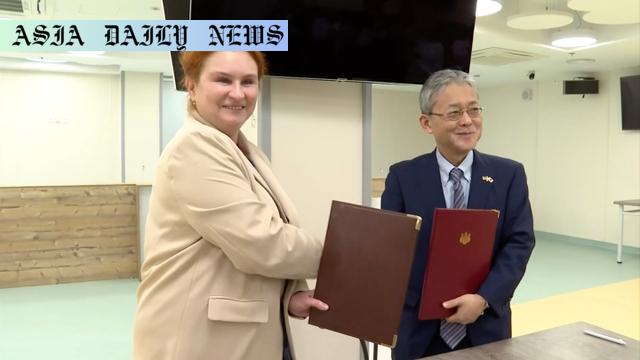Medical Equipment – Japan provides medical equipment to Okhmatdyt children’s hospital for advanced diagnosis and treatment of pediatric patients.
- Japan is providing advanced medical equipment to the damaged Okhmatdyt children’s hospital in Kyiv after a missile attack.
- The equipment includes an electron microscope to improve genetic diagnosis and pediatric treatments for cancer and other diseases.
- Japanese Ambassador to Ukraine and the hospital signed an agreement to enhance children’s medical care.

Introduction: Japan’s Generous Support to Ukraine
In an inspiring show of international solidarity, Japan has taken a commendable step to aid Ukraine, a nation grappling with the devastation of war. Following a missile attack in July that heavily damaged Kyiv’s Okhmatdyt children’s hospital, Japan has pledged to provide advanced medical equipment to ensure better healthcare for Ukraine’s pediatric patients. The move aims to help the country rebuild its critical infrastructure while addressing the medical needs of children, offering a beacon of hope amidst hardships.
A Closer Look at the Okhmatdyt Children’s Hospital
The Okhmatdyt children’s hospital holds a vital position in Ukraine’s healthcare system and is the largest state-run medical facility catering exclusively to children. In 2023 alone, despite the harsh wartime conditions, it achieved a remarkable record by conducting over 10,000 surgeries. However, the hospital sustained severe damage during the missile attack in July. The incident led to the tragic loss of two lives and left over 300 individuals injured, significantly disrupting critical pediatric treatments and operations. Restoring this key healthcare institution is not just a necessity but a symbol of resilience for Ukraine.
The Scope of Japanese Aid
Japan is extending its assistance by providing state-of-the-art medical devices to aid pediatric patients at Okhmatdyt. Among these devices is an advanced electron microscope, which will play a crucial role in diagnosing genetic disorders, cancers, and other intractable pediatric conditions. With such technology, healthcare professionals can make more precise and effective diagnoses, paving the way for improved treatment outcomes. The equipment is designed not only to benefit current patient care but also to build a foundation for advanced medical research and applications in Ukraine.
Statements of Hope and Recovery
Japanese Ambassador to Ukraine, Nakagome Masashi, expressed his hopes for the equipment’s impact, highlighting that it goes beyond restoring medical services—it represents a commitment to saving the lives of future generations. Olena Matsibokh, head of a group collaborating on the aid project, also emphasized the transformative nature of these devices. With easier and more accurate diagnosis capabilities, she noted, patient outcomes are bound to improve substantially, fostering not only recovery but also the morale of medical professionals and communities.
The Broader Implications for Ukraine
Japan’s support extends beyond mere technological aid; it signifies a shared commitment to the values of humanitarianism and international cooperation. By aiding Okhmatdyt, Japan is helping Ukraine heal its war wounds—literally and symbolically. This generous act also underscores the importance of global partnerships in navigating crises and fostering long-term national recovery. As war continues to strain Ukraine’s medical infrastructure, contributions like this set critical examples of how nations can assist one another, reaffirming faith in collective resilience.
Conclusion
The provision of medical equipment to Okhmatdyt hospital is more than a gesture of goodwill; it embodies a commitment to protecting the lives and futures of Ukraine’s children. By empowering medical professionals with the tools needed for advanced diagnosis and treatment, Japan’s support directly contributes to a brighter future for Ukraine, where young lives are nurtured amid adversity. This initiative serves as a powerful reminder that even in trying times, collaboration and compassion can drive progress and hope.



Commentary
The Remarkable Impact of Global Solidarity
In a time where the world faces unprecedented challenges, stories like Japan’s contribution to Ukraine’s Okhmatdyt children’s hospital stand as shining examples of compassion in action. This act of generosity not only demonstrates humanitarian support but also reveals the powerful role that international cooperation plays in mitigating the devastating effects of war. The integration of advanced medical equipment into Ukraine’s healthcare framework showcases how nations can come together to rebuild what has been lost, one step at a time.
The Importance of Rebuilding Healthcare Systems
Healthcare infrastructure is often one of the hardest-hit sectors during a conflict, leaving countless lives at risk. Japan’s support to aid Okhmatdyt is commendable as it goes beyond the immediate impact of repairing physical damage. By providing cutting-edge medical tools like an electron microscope, the initiative addresses both the present and long-term healthcare needs of Ukraine’s children. It also highlights how prioritizing healthcare in recovery efforts lays the groundwork for a more resilient society.
The Symbolism of Supporting Future Generations
The investment in pediatric healthcare carries profound symbolism. When we choose to help children, we ideologically commit to a brighter, more hopeful future. Japan’s thoughtful donation signals that even amidst destruction and despair, there lies a strong commitment to nurturing the leaders, thinkers, and innovators of tomorrow. It reflects the belief that every child’s life is worth saving, and that the world is collectively responsible for ensuring these lives are not just preserved but also nurtured.
Conclusion
Acts of generosity like Japan’s provision of medical equipment to Ukraine’s Okhmatdyt hospital weave a global narrative of unity and resilience. They remind us that even in the darkest times, humanity has the capacity to light the way forward. As nations, organizations, and individuals, we must continue to extend our support where it is needed most, reaffirming our connection to one another and our shared commitment to a hopeful, vibrant world.